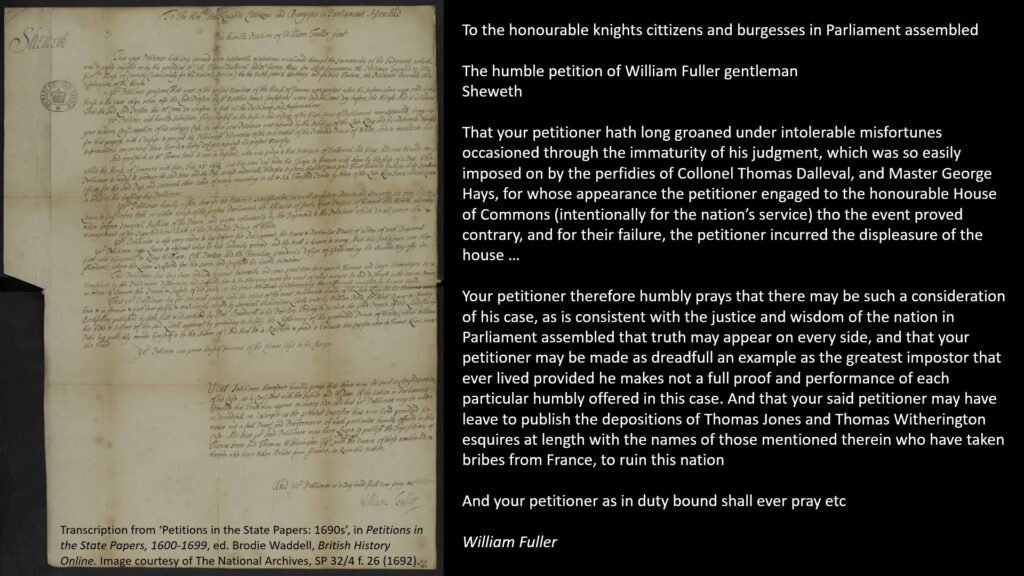The ascension of James II, a Catholic, sparked an immediate rebellion in 1685 and eventually ended three years later with the so-called Glorious Revolution that brought William III and Mary II to the throne. Over the course of these eventful reigns, thousands of their subjects sought royal favour through petitions.
As part of ‘The Power of Petitioning’ project, we have transcribed and published almost 400 of these manuscripts from across the seventeenth century on British History Online. We also completed a six-month Shared Learning Project with a large group of amateur researchers from the London Region of the University of the Third Age.
Each of these researchers wrote one or more reports about the petitioners and their requests or complaints. The introduction to this U3A project includes much more information, including important caveats about accuracy and interpretation. These 16 reports cover the period from the coronation of James II in 1685 to the end of the seventeenth century.

The Petitions and the Reports
- 1687, the inhabitants of Calne in Wiltshire ask that the king confirm the election of a new schoolmaster for their free school
- 1688, Captain Thomas Symonds requests an introduction to the Chief Governor of Ireland or a pension
- 1688, Robert Dillington and others assert that Irish soldiers should not be quartered in private houses on the Isle of Wight
- 1689, George Howse, a gentleman, seeks employment and to serve William III
- 1690, John and Thomas Temple plead for relief after their ship was plundered and sunk by order of the East India Company
- 1692, Thomas Gallentine, a merchant of Danzig, pleads that the Queen restore his ship, which has been claimed as a prize by an English privateer
- 1692, William Fuller seeks to present ‘evidence’ pertaining to the truth of ‘The Warming Pan Scandal’ to Parliament
- 1692, the officers, innkeepers and clothiers that served in, quartered, and clothed the army raised in 1677 plead for financial redress
- 1694, Robert Mackarrell, a merchant, asserts his loyalty to William III and begs for compensation after his ships were seized
- 1695, the creditors of Colonel John Browne write to the Lord Deputy of Ireland
- 1696, the Leicestershire gentry petition the King to establish a mint in that county to provide support for those working in the woollen industry
- 1697, Peter Crop and other ship masters seek recompense after their ships had been plundered
- 1699, Samuel Shepheard and others request assistance in recovering their ship and cargo after a mutiny in Borneo
- 1699, John Haynes petitions for financial compensation for the performance of his duties on behalf of the crown
- 1699, Andrew and Jeronimy Clifford plead for support in their dealings with the Governor of Surinam
- 1699, James Plunckett seeks a pardon for a charge of high treason
For further petitions and reports from the rest of the seventeenth century, return to the main ‘Investigating Petitioners’ page.
